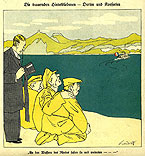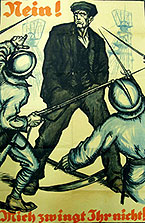Schrift: größer/kleiner
Inhaltsverzeichnis
Sie sind hier: WirRheinländer > english version > Weimar Republic, Nazi Dictatorship and Second World War (1919 - 1945) > The Rhineland during the Weimar Republic
Weimar Republic, Nazi Dictatorship and Second World War (1919 - 1945)
The Rhineland during the Weimar Republic
- The Movement for an autonomous Rhineland
- "Red Ruhr Army"
- The "Ruhrkampf" 1923
- The "Centre" as Party of the Rhineland
In December 1918 Belgium, France, Great Britain and the USA set up a military régime in the areas left of the Rhine and a narrow strip to the right of the river. Against the will of the French, under the Treaty of Versailles almost all of the Rhineland remained part of Germany, but its administrative organs were subordinated to the control of the "Inter-Allied High Commission for the Rhineland" in Koblenz. In the event that Germany should fulfil its reparation obligations correctly, the occupation was scheduled to end in 1935 at the latest.
The Movement for an autonomous Rhineland

France withdraws and leaves Adenauer
and Dorten alone
After its initial failure, France continued to strive to split off the Rhineland, enlisting the help of a movement for autonomy, with the involvement of well-known representatives in public life. Their spokesman was the Mayor of Cologne, Konrad Adenauer (1876-1967). However, his special Rhenish way within the framework of the Weimar constitution was considered too moderate by some, such as the former public prosecutor from Koblenz, Hans Adam Dorten (1880-1963), of the "Rhenish People's Union", who from 1920 with increasing openness, demanded an independent state within the German federation. After encouraging further groups of autonomists until mid-1923, the French occupying power supported an action alliance for the "creation of an independent Rhenish Republic". In the autumn this led to unrest in Düsseldorf, Aachen, Wiesbaden, Koblenz and near Honnef. It was not until the British protested that a Rhenish State would be judged as a violation of the Peace Treaty that France felt compelled to disband all separatist as-sociations.
"Red Ruhr Army"
The Rhineland had already experienced a civil war in the spring of 1920. At that time a "red Ruhr army" overran Barmen, Duisburg, Elberfeld, Essen, Remscheid and Velbert with street fighting. The ostensible cause – a radical right-wing putsch in Berlin – was eliminated within four days, so the "Ruhr army" made a stand against the central gov-ernment, led by the socialist SPD. After brutal outbreaks of violence on both sides, the government managed to quell the revolt at the beginning of April 1920.
The "Ruhr Struggle" 1923

In January 1923 the Ruhr region became a theatre of military power again, when Belgian and French soldiers seized overdue deliveries of wood and coal. Whereupon the central government declared "passive resistance" on 19th January. Civil servants were forbidden to comply with the instructions of the occupying power and general strikes paralysed industry, administration and transport. Around 150,000 people were punished, or even expelled. Most of them were administration officials, industrialists and workers. As a consequence of the cost of the mass strike, the value of the gold mark went into free-fall until November, before the policy of disobedience was given up at the end of September and a currency reform, with the introduction of the rentenmark in November 1923, put an end to the crisis.
The "Centre" as Party of the Rhineland
After 1918 the Centre remained the party of the Rhineland. Wilhelm Marx (1863-1946) the Reich Chancellor, and Heinrich Brauns (1868-1939), the Reich Minister of Labour, were both from Cologne and proved to be two cornerstones of the consolidation phase of the Weimar Republic. Although neither Marx, nor Karl Jarres (1874-1951) from Remscheid, managed to attain the office of Reich President, in 1925 a Rhinelander became provisional Head of State for 72 days, namely the former Reich Foreign Minister and Reich Court President Walter Simons (1861-1937), who had been a judge in Velbert. Reich Chancellor Philipp Scheidemann (1865-1939), Reich President Friedrich Ebert (1871-1925) and Reich Interior Minister Wilhelm Sollmann (1881-1951) from the SPD all had ties with the Rhineland, either through their constituencies in Solingen and Elberfeld-Barmen, or as chief editor of the "Rheinische Zeitung" (Rhenish newspaper). Hardly a leading social democrat was actually born there, the best known was Rudolf Breitscheid (1874-1944), Prussian Interior Minister from Cologne.


